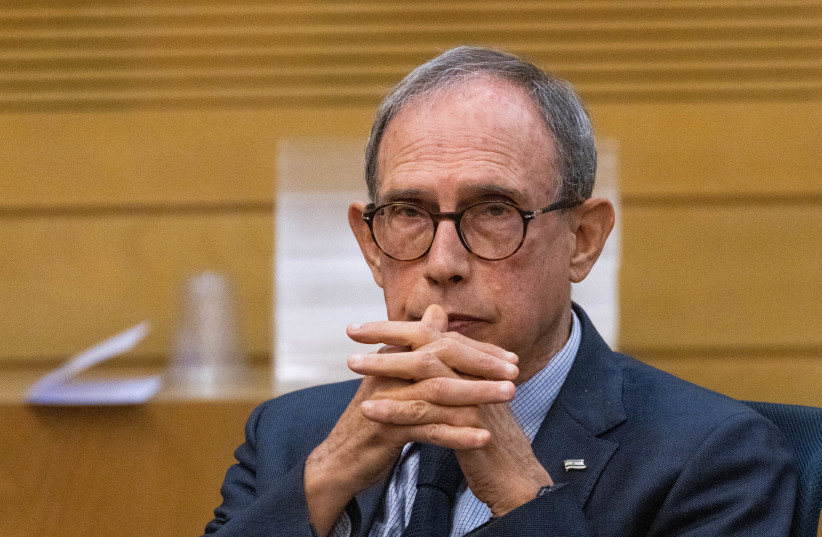It is a tale as old as terrorism itself, a mantra repeated down through the years in an attempt to make sense of the Palestinian violence directed against Israel.
Poverty breeds terrorism, we are told in authoritative tones, and hence there is no choice but to ease up on restrictions to avoid fostering further Palestinian anger and resentment.
As simple and concise as this neat little theory may sound, there is one pesky problem with it: it is categorically and demonstrably false.
And by persisting with the belief that it is true, Israeli officials are operating under an entirely misguided assumption, one with potentially dangerous consequences for us all.
The latest purveyor of this postulate was none other than Diaspora Affairs Minister Nachman Shai. In an interview on Army Radio on March 30, he asserted that “hungry people turn to terrorism. Without food and water, they will disrupt our lives.”

At first glance, Shai’s statement sounds reasonable enough. After all, a person with an empty stomach has little to lose, the thinking goes, which then leads them down the perilous path of targeting other human beings.
But like many sound bites, this contention simply does not stand up under further scrutiny.
To begin with, consider the fact that according to the World Bank, there are approximately 700 million people on the planet living in what is described as “extreme poverty,” which is defined as earning less than $1.90 a day. That is nearly 10% of the world’s population.
In America alone, according to the US Census Bureau, the official poverty rate in 2020 was 11.4%, meaning there were 37.2 million Americans officially deemed to be poor.
If the simple equation that suggests that poverty directly gives rise to terrorism were true, one would expect to find millions of people, if not more, taking up arms worldwide and launching terrorist attacks. But that is clearly not the case.
Simply put, most hungry people are not violent nor are they terrorists. They might be desperate, embittered or dissatisfied, but that is a far cry from joining the ranks of terrorists.
As Avraham Jager succinctly notes in his March 2018 paper, “Does Poverty Cause Terrorism?” which was published by the International Institute for Counter-Terrorism in Herzliya, it is actually people in the middle class who are more likely to become terrorists.
“The indigent poor,” he writes, “are too busy ensuring their survival to consider terrorist ideologies. The elite are also less inclined to engage in terror, as they are fairly satisfied with their lot. Those in the middle, however – who may stand to gain from protesting, and stand to lose if they do not – are more inclined toward terrorism.”
Numerous academic studies over the years clearly demonstrate this to be the case. As MIT Prof. Alberto Abadie concluded in a groundbreaking 2006 study titled “Poverty, Political Freedom and the Roots of Terrorism,” published in American Economic Review, there is “no significant association between terrorism and economic variables, such as income, once the effect of other country characteristics is taken into account.”
The same holds true vis-à-vis Palestinian terrorism. Studies have repeatedly found that those who engage in it are generally better off economically than most Palestinians.
One of the first to document this was the Hebrew University’s Prof. Claude Berrebi, who undertook a statistical analysis of Hamas and Islamic Jihad terrorists and published his findings in 2003, which were unequivocal.
“The resulting evidence on the individual level suggests that both higher standards of living and higher levels of education are positively associated” with the likelihood of a Palestinian joining Hamas or Islamic Jihad, Berrebi wrote.
“With regard to the societal economic condition,” he concluded, “no sustainable link between terrorism and poverty and education could be found, which I interpret to mean that there is either no link or a very weak indirect link.”
Indeed, Berrebi discovered that Palestinian suicide bombers “tend to be of higher economic status and higher educational attainment than their counterparts in the population.”
THIS IS not to suggest that poverty plays no part in fostering terrorism, for it certainly can play a contributing role, albeit largely indirect.
But we are fooling ourselves if we are thinking that the solution to terrorism is simply to boost our neighbors’ living standards.
Even if Israel were to buy every Palestinian family a plasma television set, provide them with free cable and throw in an Xbox video game console, these amenities would not deter acts of violence, which are driven not by indigence but by an ideology of hate.
To view Palestinian terrorism entirely through the prism of economics is essentially a Marxist approach, one that assumes that human beings are motivated solely or primarily by economic factors. We know that life is far more complicated than that, and yet our leaders persist in pursuing policies based on this simplistic and erroneous notion, which are necessarily destined to fail.
The bottom line is that despair does not create terrorists; doctrine does. And only a counterterrorism policy that takes this into account has any chance of success.
The writer served as deputy communications director under prime minister Benjamin Netanyahu during his first term of office.
